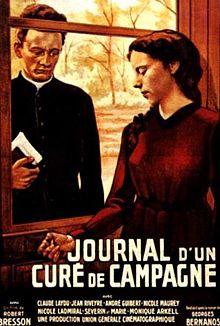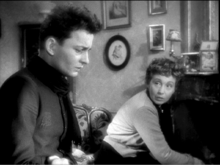- Diary of a Country Priest
-
Diary of a Country Priest 
Film posterDirected by Robert Bresson Produced by Léon Carré
Robert SussfeldWritten by Georges Bernanos (novel)
Robert BressonStarring Claude Laydu
Jean Riveyre
André GuibertMusic by Jean-Jacques Grünenwald Cinematography Léonce-Henri Burel Editing by Paulette Robert Distributed by Brandon Films Inc. Release date(s) February 7, 1951 Running time 115 min. Country France Language French Diary of a Country Priest (original French title: Journal d'un curé de campagne) is a 1951 French film directed by Robert Bresson, and starring Claude Laydu. It was closely based on the novel of the same name by Georges Bernanos. Published in 1937, the novel received the Grand prix du roman de l'Académie française. It tells the story of a young, sickly priest, who has just arrived in his first parish, a village in northern France. The novel has been translated to English by Pamela Morris and was published the same year as the French original.
Two other French scriptwriters, Jean Aurenche and Pierre Bost had wanted to make film adaptations of the novel. Bernanos rejected Aurenche's first draft, and by the time Bresson got around to the task, Bernanos had died. Bresson said he "would have taken more liberties" if Bernanos were still alive.[1] The film had considerable influences on Martin Scorsese's Taxi Driver.[2]
Contents
Plot
A young priest arrives at Ambricourt, his new parish. He is not welcome. The girls of the catechism class laugh at him in a prank, whereby only one of them appears to know the Scriptural basis of the Eucharist so that the rest of them can laugh at their private conversation. His colleagues criticize his diet of bread and wine and ascetic lifestyle. Concerned about Chantal, the daughter of the Countess, the priest visits the Countess at the family chateau, and appears to help her resume communion with God after a period of doubt, but she dies during the following night, allowing her daughter to spread false rumors that the priest's harsh words had tormented her to death. Refusing confession, Chantal had previously spoken to the priest about her hatred of her parents.
The older priest from Torcy talks to his younger colleague about his poor diet and lack of prayer, but he remains unable to focus on doing so. After his health worsens, the priest goes to the city to visit a doctor, who diagnoses him with stomach cancer. The priest goes to a former colleague who has lapsed and is now an apothecary, and lives with a woman outside wedlock. He dies in the druggist's house after being blessed by him. Two famous lines from the end include "God is not a torturer" (Scorsese's favorite line[3]) and "All is grace."
Cast
- Claude Laydu - Priest of Ambricourt
- Jean Riveyre - Count (Le Comte)
- Adrien Borel - Priest of Torcy (Curé de Torcy) (as Andre Guibert)
- Rachel Bérendt - Countess (La Comtesse) (as Marie-Monique Arkell)
- Nicole Maurey - Miss Louise
- Nicole Ladmiral - Chantal
- Martine Lemaire - Séraphita Dumontel
- Antoine Balpêtré - Dr. Delbende (Docteur Delbende) (as Balpetre)
- Jean Danet - Olivier
- Gaston Séverin - Canon (Le Chanoine) (as Gaston Severin)
- Yvette Etiévant - Femme de ménage
- Bernard Hubrenne - Priest Dufrety
- Léon Arvel - Fabregars
Awards
The film won eight international awards, including the Grand Prize at the Venice International Film Festival, and the Prix Louis Delluc.
References
- ^ François Truffaut, "A Certain Tendency of the French Cinema" Film Theory: Critical Concepts in Media and Cultural Studies ed. Philip Simpson. New York: Taylor & Francis (2004): 11
- ^ Martin Scorsese: Interviews, ed. Peter Brunette. Jackson, Mississippi: University Press of Mississippi (1999): 67. "Don't forget that is what the priest is doing in Diary of a Country Priest."
- ^ Robert Castillo, Gangster Priest: The Italian American Cinema of Martin Scorsese. Toronto: University of Toronto Press (2006): 389. "'God is not a torturer,' to quote Scorsese's favourite line from Bresson's The Diary of a Country Priest."
External links
- Diary of a Country Priest at the Internet Movie Database
- Diary of a Country Priest at AllRovi
- Plot summary and insight at RottenTomatoes
- Voted #11 on The Arts and Faith Top 100 Films (2010)
- Criterion Collection essay by Frederic Bonnaud
Films directed by Robert Bresson Les affaires publiques (1934) • Les Anges du péché (1943) • Les Dames du Bois de Boulogne (1945) • Diary of a Country Priest (1951) • A Man Escaped (1956) • Pickpocket (1959) • The Trial of Joan of Arc (1962) • Au Hasard Balthazar (1966) • Mouchette (1967) • A Gentle Woman (1969) • Four Nights of a Dreamer (1971) • Lancelot du Lac (1974) • The Devil Probably (1977) • L'Argent (1983)
Categories:- French films
- French novels
- 1937 novels
- 1951 films
- Films based on novels
- Films directed by Robert Bresson
- Catholic films
- Christian films
- Films about priests
- Roman Catholic Church novels
Wikimedia Foundation. 2010.

